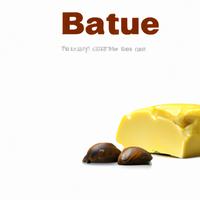
1 serving (14 grams) contains 124 calories, 0.0 grams of protein, 14.0 grams of fat, and 0.0 grams of carbohydrates.

Log this food in SnapCalorie

Nutrition Information
Calories |
2104.8 | ||
|---|---|---|---|
% Daily Value* |
|||
| Total Fat | 238.1 g | 305% | |
| Saturated Fat | 142.9 g | 714% | |
| Polyunsaturated Fat | 0 g | ||
| Cholesterol | 0 mg | 0% | |
| Sodium | 0 mg | 0% | |
| Total Carbohydrates | 0 g | 0% | |
| Dietary Fiber | 0 g | 0% | |
| Sugars | 0 g | ||
| protein | 0 g | 0% | |
| Vitamin D | 0 mcg | 0% | |
| Calcium | 0 mg | 0% | |
| Iron | 0.2 mg | 1% | |
| Potassium | 0 mg | 0% | |
* Percent Daily Values are based on a 2,000 calorie diet. Your daily values may be higher or lower depending on your calorie needs.
Food Attributes
Source of Calories
About Cocoa butter
Cocoa butter is a pale-yellow fat extracted from cocoa beans, widely used in food, cosmetics, and pharmaceuticals. Originating from South America and West Africa, it plays a pivotal role in chocolate production, lending a smooth texture and rich flavor. Nutritionally, cocoa butter primarily consists of healthy fats, including oleic, stearic, and palmitic acids, which can support heart health when consumed in moderation. It contains antioxidants like polyphenols, which may help reduce inflammation and improve skin health. However, cocoa butter is calorie-dense, meaning excessive consumption may contribute to weight gain. It is naturally free of dairy, making it suitable for vegan diets, but lacks significant vitamins, minerals, and protein. Popular in baking and confectionery, cocoa butter enhances both flavor and texture in recipes, but as with any fat, portion size is key for maintaining a balanced diet.



